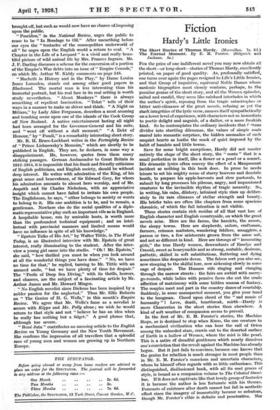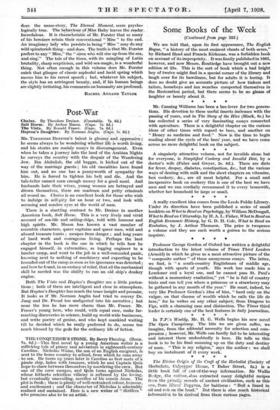Fiction
Hardy's Little Ironies
Jackson. 58.) FOR the price of one indifferent novel you may now obtain all the short—or long-short—stories of Thomas Hardy, excellently printed, on paper of good quality. As, profoundly satisfied, one turns over again the pages resigned to Life's Little Ironies, and that Group of impulsive, equivocal Noble Dames whose sardonic biographies most closely conform, perhaps, to the peculiar genius of the short story, and all the Wessex episodes, salted and candid, they seem like subdued interludes in which the author's spirit, reposing from the tragic catastrophes or bitter anti-climaxes of the great novels, refusing as yet the stark integrities of the lyric verse, amuses itself sympathetically on a lower level of experience, with characters not so immediate to poetic delight and anguish, of a dallier, or a more freakish kind. So he contemplates the ordinary incidents that f-rtune divides into startling dilemmas, the values of simple souls snared into romantic surprises, the hidden anomalies of such unquiet hearts as loathe the mask of quiet imposed by the habit of hamlets and little towns.
Save for some bright exceptions, Hardy did not master entirely the shape of the short story, the " conte " that is a small perfection in itself, like a flower or a pearl or a sonnet. His dramatic lyrics often convey the effect of a Maupassant incident as nothing in this book does. In prose he needs leisure to set his mighty scene of starry heavens and desolate heath, to prepare his apple-harvests and slow pastorals, to submit by long processes his piteous, angry, and impassioned creatures to the invincible rhythm of tragic necessity. So, in writing, his calm, dilatory, latinized style rises up deliber- ately to its rare climaxes of stellar strength and beauty. His briefer tales are often like chapters from some spacious chronicle, of which the full intention is not visible.
These stories contain rich residue of all that vast lore of English character and English countryside, on which the great novels arise. Here are the farms, the hamlets, the moors, the sleepy towns. Here are shepherds, sailors, craftsmen, farmers, crimson monsters, wandering fiddlers, smugglers,• a parson or two, a few aristocrats grown from the same soil, and not so different in kind. Here are throngs of " invocating girls," the true Hardy women, descendants of Emelye and Cressid, sweet as honeysuckle and as strong, mutable, desirous, pathetic, skilled in soft substitutions, fluttering and dying sometimes like desperate doves. The falcon sort you also see, now stooping to the skilful lure, now sickening slowly in some cage of despair. The Hussars ride ringing and clanging through the narrow streets : the fairs are awhirl with merry- go-rounds, while ladies with pensive faces eke out the crude affection of matrimony with some hidden manna of fantasy. The couples meet and part in the country dance of courtship. Suddenly, in some unsuspected moment, you give your hand to the hangman. Chord upon chord of the " sad music of humanity " I Love, death, heartbreak, mirth—Hardy is more Chaucerian in the short stories than elsewhere. A kind of soft weather of compassion seems to prevail.
In the first of Mr. E. M. Forster's stories, the Machine Stops, or is destined to stop when Kuno, the one creature in a mechanized civilization who can hear the call of Orion among the unheeded stars, crawls out to the deserted surface of Earth in a hollow of Wessex, where the mist is like pearl. This is a satire ctf dreadful gentleness which nearly dissolves one's conviction that the revolt against the Machine has already begun. But it just fails to convince, because one knows that the genius for rebellion is much stronger in most people thin in Mr. E. M. Forster's conscious and uncertain characters; whom he himself often regards with so little enthusiasm. This distinguished, disillusioned book, with all its cool graces of style, is bound as a companion volume to The Celestial Omni- bus. If it does not captivate like that lovely group of fantasies it is because the author is less fortunate with his themes. Forecasts of existence after death cannot but fail in aesthetic effect since the imagery of immortality became so nebulous, though Mr. Forster's ethic is definite and penetrative. Nor
does the name-story, The Eternal Moment, seem psycho- . logically true. The behaviour of Miss Raby leaves the reader incredulous. It is characteristic of Mr. Forster that so many of his heroines retain their conventional " Miss " to the end. An imaginary lady who persists in being " Miss 7 may do any wild spinsterish thing—and does. The truth is that Mr. Forster prefers to any " Miss," the." siren who will rise up from the sea, and sing." The tale of the Siren, with its mingling of Latin brutality, sharp scepticism, and wild sea-magic, is a wonderful thing. Not often enough in this volume does Mr. Forster catch that glimpse of classic asphodel and lucid spring which moves him to his rarest speech ; but, whatever his subject, the style has an astringent beauty, and if his human beings are slightly irritating, his comments on humanity are profound.
RACHEL ANNAND TAYLOR







































 Previous page
Previous page